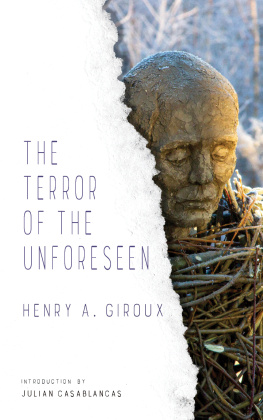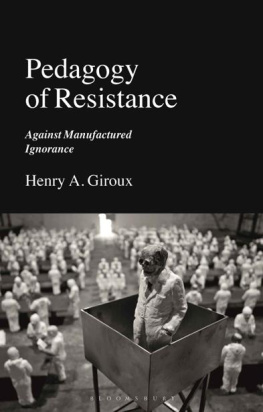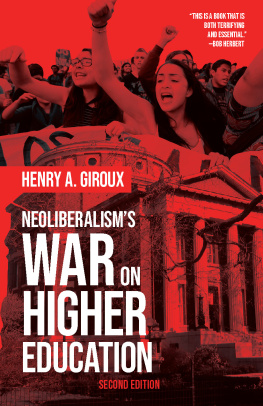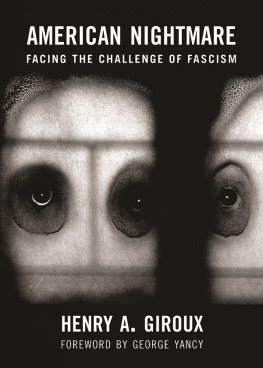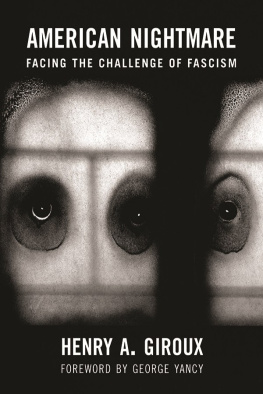Henry A. Giroux - The Violence of Organized Forgetting: Thinking Beyond Americas Disimagination Machine
Here you can read online Henry A. Giroux - The Violence of Organized Forgetting: Thinking Beyond Americas Disimagination Machine full text of the book (entire story) in english for free. Download pdf and epub, get meaning, cover and reviews about this ebook. year: 2014, publisher: City Lights Publishers, genre: Politics. Description of the work, (preface) as well as reviews are available. Best literature library LitArk.com created for fans of good reading and offers a wide selection of genres:
Romance novel
Science fiction
Adventure
Detective
Science
History
Home and family
Prose
Art
Politics
Computer
Non-fiction
Religion
Business
Children
Humor
Choose a favorite category and find really read worthwhile books. Enjoy immersion in the world of imagination, feel the emotions of the characters or learn something new for yourself, make an fascinating discovery.

- Book:The Violence of Organized Forgetting: Thinking Beyond Americas Disimagination Machine
- Author:
- Publisher:City Lights Publishers
- Genre:
- Year:2014
- Rating:5 / 5
- Favourites:Add to favourites
- Your mark:
The Violence of Organized Forgetting: Thinking Beyond Americas Disimagination Machine: summary, description and annotation
We offer to read an annotation, description, summary or preface (depends on what the author of the book "The Violence of Organized Forgetting: Thinking Beyond Americas Disimagination Machine" wrote himself). If you haven't found the necessary information about the book — write in the comments, we will try to find it.
Henry Giroux has accomplished an exciting, brilliant intellectual dissection of Americas somnambulent voyage into anti-democratic political depravity. His analysis of the plight of Americas youth is particularly heartbreaking. If we have a shred of moral fibre left in our beings, Henry Giroux sounds the trumpet to awaken it to action to restore to the nation a civic soul.--Dennis J. Kucinich, former US Congressman and Presidential candidate
Giroux lays out a blistering critique of an America governed by the tenets of a market economy. . . . He cites French philosopher Georges Didi-Hubermans concept of the disimagination machine to describe a culture and pedagogical philosophy that short-circuits citizens ability to think critically, leaving the generation now reaching adulthood unprepared for an inhospitable world. Picking apart the current malaise of 21st-century digital disorder, Giroux describes a world in which citizenship is replaced by consumerism and the functions of engaged governance are explicitly beholden to corporations.--Publishers Weekly
In a series of essays that explore the intersections of politics, popular culture, and new forms of social control in American society, Henry A. Giroux explores how state and corporate interests have coalesced to restrict civil rights, privatize whats left of public institutions, and diminish our collective capacity to participate as engaged citizens of a democracy.
From the normalization of mass surveillance, lockdown drills, and a state of constant war, to corporate bailouts paired with public austerity programs that further impoverish struggling families and communities, Giroux looks to flashpoints in current events to reveal how the forces of government and business are at work to generate a culture of mass forgetfulness, obedience and conformity. In The Violence of Organized Forgetting, Giroux deconstructs the stories created to control us while championing the indomitable power of education, democracy, and hope.
Henry A. Giroux is a world-renowned educator, author and public intellectual. He currently holds the Global TV Network Chair Professorship at McMaster University in the English and Cultural Studies Department and a Distinguished Visiting Professorship at Ryerson University. The Toronto Star has named Henry Giroux one of the twelve Canadians changing the way we think.
More Praise for Henry A. Girouxs The Violence of Organized Forgetting:
I can think of no book in the last ten years as essential as this. I can think of no other writer who has so clinically dissected the crisis of modern life and so courageously offered a possibility for real material change.--John Steppling, playwright, and author of The Shaper, Dogmouth, and Sea of Cortez
A timely study if there ever was one, The Violence of Organized Forgetting is a milestone in the struggle to repossess the common sense expropriated by the American power elite to be redeployed in its plot to foil the popular resistance against rising social injustice and decay of political democracy.--Zygmunt Bauman, author of Does the Richness of the Few Benefit Us All? among other works
Henry A. Giroux: author's other books
Who wrote The Violence of Organized Forgetting: Thinking Beyond Americas Disimagination Machine? Find out the surname, the name of the author of the book and a list of all author's works by series.

